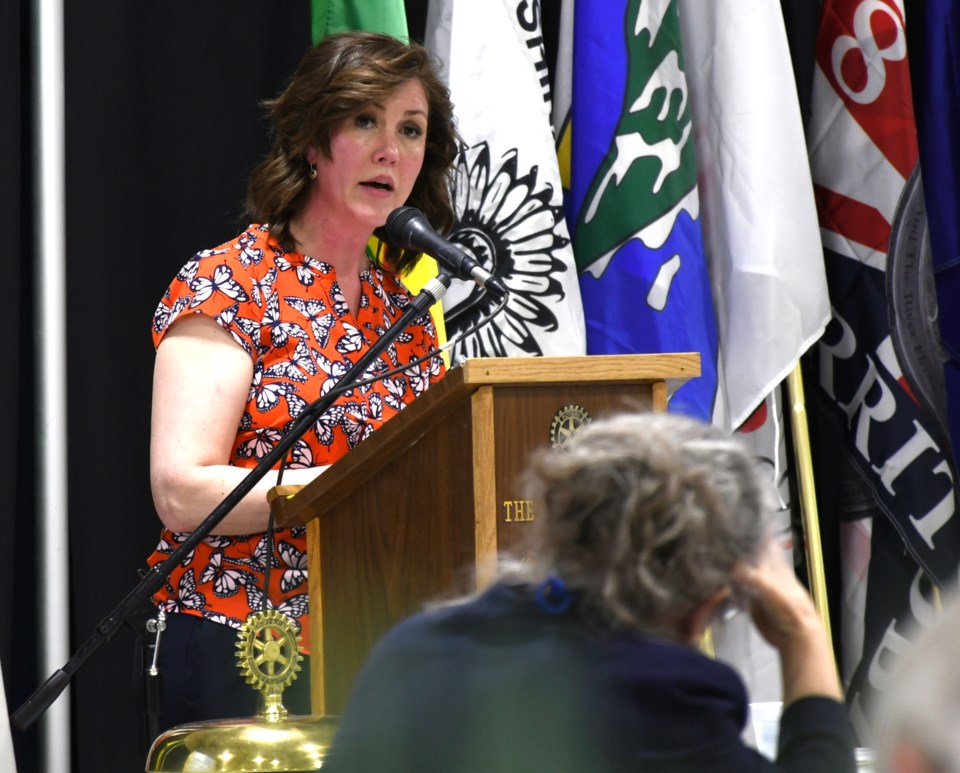The Rotary Club of Moose Jaw Wakamow held its first-ever public conference May 10 – 11 at the Moose Jaw Exhibition Company’s Convention Centre with guest speakers addressing this year’s theme of “hope and mental wellness.”
On May 10, Dusti Hennenfent with the Canadian Mental Health Association (CMHA) shared insights from her personal experience.
“I thank my son for letting me experience his mental health journey beside him. It has profoundly changed my understanding of what people go through,” Hennenfent said.
“It made me realize how many different people are involved in supporting a person’s recovery.”
Following the social isolation of the pandemic, Hennenfent’s autistic son – in Grade 11 in 2020 – started acting differently and his teacher reached out when the otherwise studious and rule-abiding student began to fail his class. Hennenfent’s attention had been diverted by the busy ebb and flow of life but now her sense of confidence started to wane.
Reflecting on her father who was diagnosed as bipolar and who committed suicide one year before her son was born, she decided to ask if he was at risk of harming himself. His reply was an alarming “Yes.”
She recalled feeling a sense of “utter helplessness” and started making calls to determine how to handle the situation.
“We needed to be the support for our son he didn’t have at the time,” she reflected.
The experience was a testament to the cruel power mental health can wield. She described recovery as several little steps in the right direction and said the experience taught her about empathy and patience.
Hennenfent returned to university 25 years after graduating to study psychology. She began volunteering with the CMHA and was soon offered a permanent position where she continues to work.
Through a Dungeons and Dragons program at the CMHA, her son was able to spend time with like-minded youths in an atmosphere of compassion and connection.
“For the first time ever, he had something he genuinely looked forward to,” she said, describing the game as “the hook he needed” to recover.
An employment opportunity at the Moose Jaw & District Food Bank led by Client Resource Manager Cheantelle Fisher “shifted the trajectory” of his life immeasurably, Hennenfent said, thanks to Fisher’s “infinite patience, understanding, and support.”
Her son is turning 21 this year, works a full-time job, and is living independently.
An act of kindness profoundly influences mental health. This can be something as easy as smiling at a stranger to – as she learned from her son – a simple card game.
She described compassion as “a powerful force for change,” but said alone it’s not enough.
“The truth is that we humans are wired for connection.” Yet, she continued, “In a world where we are more connected digitally than ever before, we often find ourselves lacking in true, authentic human connection.”
Building social connection isn’t a passive endeavour, and Hennenfent said it’s not just about offering support when things go wrong. It’s about building a community where everyone feels valued and can participate in spaces and clubs where they can be their authentic selves – free of judgment and stigma.
She said it’s time to break the barrier and “shatter the stigma surrounding mental health.”
To achieve this, individuals must be willing to step outside of their comfort zones, speak honestly about their own struggles, and foster inclusive environments. Even a simple text or acknowledgement can create “waves of positivity and hope.”
“Let us be the beacons of hope in a world so desperately in need of it,” she continued. “And together, let’s build a future for mental health that isn’t a source of shame, but a cause for compassion and connection.”
To learn more about the CMHA, visit MooseJaw.CMHA.ca, call 306-692-4240, or email [email protected].




